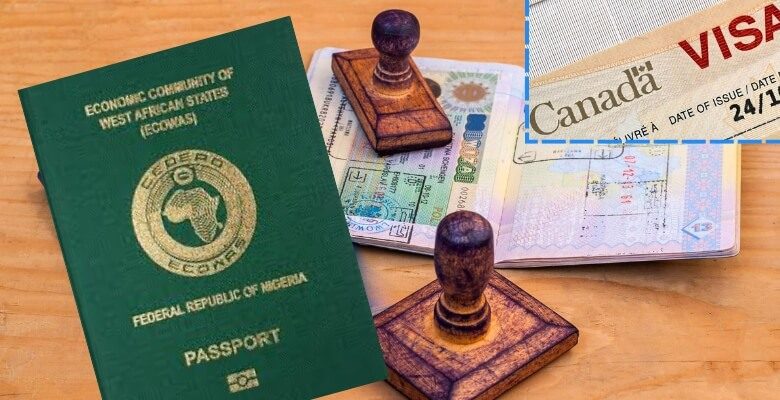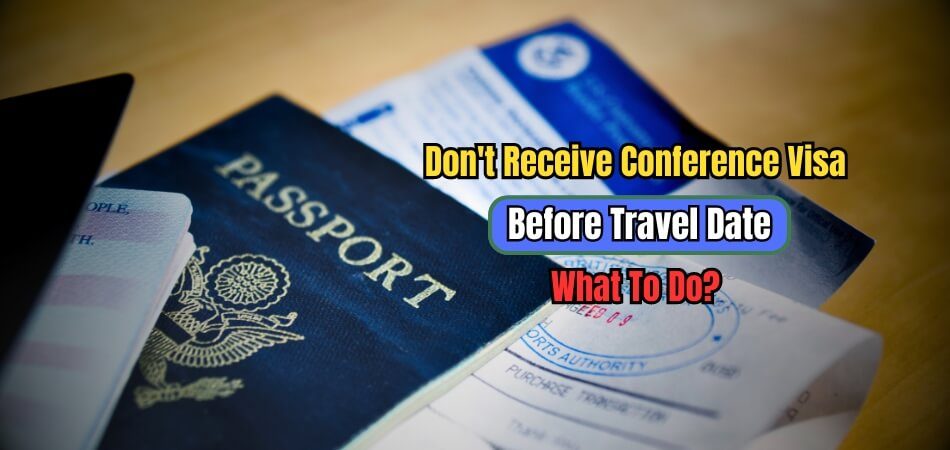Professional development is maximized through conference attendance, which provides an opportunity for networking, learning, and collaboration. The ability to participate in these important conferences requires international attendees to obtain a conference visa. However, What should I do if I don’t receive my conference visa before my travel date?
A quick response is essential if this occurs. Contact the Embassy immediately to check the status of your application. It’s also beneficial to communicate with conference organizers, who may provide additional support or guidance.
Also, expedited processing may be a viable option to ensure you don’t miss out. Continue reading to discover more detailed strategies and tips on dealing with this challenging situation efficiently.
A Conference Visa- What is its Significance?
The conference visa is a specialized travel authorization intended for people attending international meetings, seminars, or conferences. The visa allows professionals to interact with peers around the world, sharing knowledge and experience. For those planning to attend a Canada Conference With Invitation Letter, this visa facilitates the exchange of ideas across borders, benefiting both personal and professional lives.
A conference visa is essential for those planning to attend a global conference from abroad. It ensures legal entry into the hosting country, aligning with international travel and security regulations. Without this visa, participants may miss invaluable learning and networking opportunities.
Obtaining a conference visa usually requires applying along with an invitation from the event organizers. This invitation is crucial in establishing the purpose of the visit and the legitimacy of the applicant’s participation in the event.
Following the event, applicants often need to prove their intent to return home. Timely application is necessary to avoid any disruptions to travel plans, providing a smooth and productive conference experience.
How Long Does It Take to Get a Conference Visa?
The duration of securing a conference visa can vary widely depending on the country of destination. Generally, it takes a few weeks to a few months. When traveling abroad, it is essential to plan ahead so you have time to obtain your visa. Here are some factors that affect the process of obtaining a conference visa.
Application Processing Time
Each country’s embassy or consulate has its own timeline for processing visa applications. During peak travel seasons, processing times can be longer. It’s wise to apply as early as possible to accommodate delays.
Required Documentation
The completeness and accuracy of your application have a significant impact on the processing time. Missing or incorrect documents can lead to delays or rejections. Be sure to submit all necessary documents, including invitation letters and proof of accommodation. Double-checking your application before submission can prevent common mistakes.
Embassy Workload
The workload at the embassy or consulate also plays a significant role in processing time. During busy periods, such as the holiday season or large international events, delays are more likely. It’s advisable to consider these factors when planning your application submission.
Personal and National Factors
Certain personal factors, like your nationality or previous visa history, can influence the duration of visa processing. Applicants from countries with high fraud rates might face longer reviews. Similarly, previous visa violations can complicate and lengthen the process, making early application beneficial.
What Should I Do If I Don’t Receive My Conference Visa Before My Travel Date?
When facing uncertainty about your travel plans, knowing what should I do if I don’t receive my conference visa before my travel date can help alleviate stress. Taking proactive steps can ensure that you remain prepared for any situation.
Finding out that you haven’t received your conference visa just before your travel date can be incredibly stressful. However, there are steps you can take to manage the situation effectively and minimize any potential disruptions to your plans. Here’s what you should do if you find yourself in this predicament.
Check Your Application Status
The first step is to check the status of your visa application. Most countries provide an online system where you can track your application. Make sure to gather all the necessary information, such as your application reference number, to access this system.
If you notice any unusual delays or if the status hasn’t changed for an extended period, it may indicate an issue that needs immediate attention. If your application included Proof of Previous Trips Abroad for a Conference Visa, mention this when checking to ensure it’s being considered.
Contact the Visa Office
If your visa status is unclear or hasn’t been updated, the next step is to directly contact the visa office or embassy where you submitted your application. Explain your situation calmly and provide them with all the relevant details, including your application number, travel date, and the purpose of your visit.
Sometimes, visa offices can expedite processing if they are made aware of the urgency. Be sure to ask if there’s any additional information or documentation you can provide to facilitate a quicker decision.
Inform the Conference Organizers
It’s essential to inform the conference organizers about your situation as soon as possible. Many international conferences are accustomed to dealing with visa issues, and they may be able to offer assistance or advice.
For example, some conferences can provide an official letter to the visa office, explaining the importance of your participation. If the event is particularly significant, this letter might help expedite your visa process.
Explore Alternative Travel Options
If your visa doesn’t arrive in time, consider exploring alternative options. Some countries allow for visa-on-arrival for certain nationalities, or you might be able to apply for an emergency visa if such provisions exist.
Additionally, check if there are any nearby consulates or embassies that can process your visa application more quickly. In some cases, traveling to a neighboring country where the visa process is faster might be an option, though this requires careful planning and additional resources.
Delay Your Travel Plans
If your visa isn’t likely to arrive before your original travel date, consider delaying your travel. While this might be inconvenient, it’s often better than risking traveling without a visa. Contact your airline or travel agent to see if your flight can be rescheduled.
Some airlines may offer flexibility if you explain your situation. Likewise, if you’ve booked accommodation, inform them of your delay and see if your reservation can be modified.
Prepare for a Virtual Attendance
If all else fails and you cannot obtain your visa in time, check if the conference offers a virtual attendance option. In the wake of the COVID-19 pandemic, many conferences have become hybrid, offering both in-person and virtual participation.
While not ideal, attending virtually still allows you to benefit from the conference content, network with other professionals, and participate in discussions.
Reflect on Future Planning
Finally, use this experience to improve your future travel planning. Visa processes can be unpredictable, so apply for future visas as early as possible. Keep track of the processing times and follow up proactively.
You might also consider purchasing travel insurance that covers costs associated with visa delays, such as rescheduling flights or accommodations.
If you don’t receive your conference visa before your travel date, the key is to stay calm and proactive. By checking your application status, contacting the visa office, informing conference organizers, exploring alternative travel options, delaying your plans, considering virtual attendance, and reflecting on future planning, you can manage the situation effectively. Remember, while this setback can be frustrating, handling it with patience and organization can help mitigate its impact on your professional goals.
Seeking Expedited Processing- Does it Work?
Yes, seeking expedited processing can be effective, especially in time-sensitive situations. This option is designed for urgent travel needs, including attending international conferences. However, availability and effectiveness can vary by country and specific embassy policies.
When time is of the essence, seeking expedited processing for your conference visa can be a lifesaver. This option is designed to speed up the application process, but it’s essential to understand how it works and whether it’s effective.
First, it’s important to know that expedited processing is not universally available for all types of visas or in every country. However, many embassies and consulates offer this service for urgent situations. Here’s how it typically works.
Eligibility Check
Before applying for expedited processing, verify if your situation qualifies. Generally, you may need to demonstrate an urgent need, such as attending an important conference or meeting.
Application Submission
When submitting your visa application, clearly indicate your request for expedited processing. This usually involves filling out a specific form or checking a box on the application.
Additional Fees
Be prepared to pay extra fees for expedited processing. These fees can vary significantly, so it’s wise to check the specific costs associated with your application.
Processing Time
While expedited processing can significantly reduce the waiting time, it doesn’t guarantee instant approval. Depending on the embassy’s workload, you may still experience some delays.
Follow-Up
After applying, maintain regular communication with the visa office. This can help you stay updated on your application status and address any issues quickly.
Seeking expedited processing can be effective if you have a legitimate reason for urgency and follow the proper procedures. It’s always a good idea to plan ahead, but when circumstances require speed, knowing how to navigate this option can make a big difference in your travel plans.
Essential Tips on Monitor The Status of Your Visa Application
Keeping an eye on your visa application status is key to planning your trip effectively and ensuring everything goes according to plan. Staying informed helps you manage your preparations and respond to any potential issues promptly. Here are some essential tips to keep a close eye on your application process.
- Use Online Tracking Tools: Most embassies provide online portals where applicants can check their visa status. Simply enter your application number and personal details to receive updates. This is the quickest way to check the status of your conference visa application without any hassle.
- Register for Notifications: Sign up for email or SMS notifications if the service is available. This way, you’ll receive automatic updates directly from the visa processing center.
- Contact the Visa Application Center: If the online tools are unclear, call the center directly. Be sure you have your application details handy for a quick and informative response.
- Keep Copies of All Documents: Always keep copies of your application and supporting documents. They are often required when enquiring about your application status.
- Consult Your Travel Agency: If you use a travel agency, they could monitor the status for you. Their experience and contacts can provide additional insights and support.
- Check Often After Interviews or Submissions: After any in-person interviews or additional document submissions, check your status frequently. Changes or updates might occur shortly after these events.
The status of your visa application can significantly ease your travel preparations if you monitor it regularly. By checking regularly and using available tools, you will be well-informed and ready to address any changes that may arise.
Frequently Asked Questions
The following are some FAQs and answers to help you figure out what should I do if I don’t receive my conference visa before my travel date.
Is There a Deadline for Receiving My Conference Visa Before the Event?
While there may not be a specific deadline for receiving your conference visa before the event, it’s crucial to allow sufficient time for visa processing and potential delays. Aim to apply for your visa well in advance of your travel date to avoid last-minute complications.
What Are My Options if I Don’t Receive My Conference Visa on Time?
Consider rescheduling your travel plans or exploring virtual participation options if available.
Can the Conference Organizers Assist Me if My Visa Is Delayed?
Conference organizers may be able to provide support or guidance if your visa is delayed. Reach out to them as soon as possible to explain your situation and see if they can offer any assistance or advice.
What if My Visa Application Is Rejected?
If your visa application is rejected, review the reasons for rejection provided by the consulate and consider reapplying with any necessary adjustments or additional documentation.
Should I Cancel My Travel Plans if I Don’t Receive My Conference Visa on Time?
It’s advisable not to cancel your travel plans immediately if you haven’t received your conference visa on time. Instead, explore alternative options such as contacting the event organizers for assistance or seeking advice from immigration experts.
What Should I Do to Prevent Similar Visa Delays in The Future?
Ensure you submit a complete and accurate visa application well in advance of your intended travel date, allowing ample time for processing and potential delays.
Conclusion
The opportunity to attend conferences internationally provides a unique means for professional development and networking. However, visa delays can make participation difficult.
As we talked about in our discussion on “What should I do if I don’t receive my conference visa before my travel date?” we found that you should take immediate action, starting with contacting the embassy to verify your application status. It’s also advisable to discuss expedited processing options that might be available.
Coordinating with conference organizers can provide additional support and insights. Moreover, having a backup plan, such as virtual participation, guarantees your engagement with the conference proceedings, regardless of travel complications.








